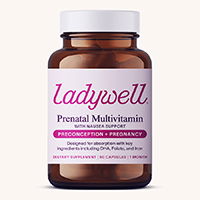Let's talk about a natural transition that every woman experiences: perimenopause.
This phase marks a new chapter as we approach menopause, celebrating the evolution of our bodies. It's an important time of change that touches all facets of our lives, bringing new experiences and insights.
It typically starts in our 40s but can begin as early as our 30s, varying greatly from one woman to another.
The hallmarks of this stage are fluctuating hormone levels, which can trigger various symptoms - 34, to be precise.
But What Are The 34 Symptoms Of Perimenopause?
Let's demystify this journey together as we look at the 34 symptoms of perimenopause.
What Are The 34 Symptoms Of Perimenopause Every Woman Should Know?
Recognizing the symptoms of perimenopause can empower you with knowledge and preparedness.
These changes are natural but can be challenging, affecting our physical health, emotional well-being, and daily life.
Let's explore the 34 signs of perimenopause, understanding that each is a thread in the larger tapestry of this life stage.
Physical Changes:
- Irregular Periods. The most common sign is indicating changes in your menstrual cycle.
- Hot Flashes. Sudden feelings of warmth, often with flushing and night sweats.
- Breast Tenderness. Fluctuating hormones can lead to discomfort.
- Decreased Libido. Hormonal changes may affect your sexual desire.
- Vaginal Dryness. Reduced estrogen levels can decrease moisture production.
- Fatigue. Feeling unusually tired without a clear cause.
- Sleep Problems. Difficulty falling or staying asleep.
- Bladder Issues. Increased urgency or frequency of urination.
- Body Composition Changes. Possible increase in body fat, especially around the abdomen.
- Skin Elasticity and Moisture Changes. Your skin may become drier and less elastic.
Emotional and Psychological Effects:
- Mood Swings. Rapid changes in mood without a clear reason.
- Irritability. Feeling easily annoyed or frustrated.
- Anxiety. Increased feelings of worry or nervousness.
- Depression. Persistent sadness or loss of interest in activities.
- Difficulty Concentrating. Trouble focusing on tasks or remembering things.
- Memory Lapses. Forgetting names or why you entered a room.
- Reduced Stress Tolerance. Feeling overwhelmed by stress more easily.
Other Notable Symptoms:
- Headaches
- Joint and Muscle Pain
- Digestive Problems
- Changes in Taste and Smell
- Dizziness
- Changes in Gum Health
- Tingling Extremities
- Electric Shock Sensations
- Weight Gain
- Hair Loss or Thinning
- Increased Hair Growth on Other Body Parts
- Changes in Fingernails: splitting or cracking
- Allergies: new or worsening
- Irregular Heartbeat
- Breathing Difficulties
- Dry Eyes
- Ear Ringing
Recognizing these symptoms is your first step towards navigating perimenopause with grace and self-compassion.
Managing The 34 Symptoms Of Perimenopause: Quick Tips
While the journey is nuanced, integrating simple strategies into your daily life can make a significant difference:
- Cultivate a Wellness Routine. Balance your diet, embrace gentle exercise, and keep a good sleep routine.
- Lean on Supplements. Nutritional support can be a game-changer in managing symptoms. Find your ally in supplements tailored for this stage of life.
- Nurture Your Emotional Well-being. Practices like meditation, journaling, or chatting with friends can provide solace and strength.
Lifestyle Changes to Alleviate the 34 Symptoms of Perimenopause
Adjusting your lifestyle can significantly alleviate the symptoms of perimenopause, restoring balance and well-being.
These tweaks aren't about overhauling your life overnight; they're about integrating small, sustainable changes that can make a big difference.
Dietary Adjustments: Nourish Your Body
- Focus on Phytoestrogens. Foods like soy, flaxseeds, and chickpeas contain phytoestrogens, which may help balance hormones naturally.
- Calcium and Vitamin D. Bone health becomes paramount during this time. Incorporate dairy products, leafy greens, and fortified foods into your diet.
- Limit Trigger Foods. Caffeine, alcohol, and spicy foods can exacerbate hot flashes and mood swings. Observing how your body reacts to different foods can guide you to make more comfortable choices.
Physical Activity: Move to Improve
- Consistent Exercise. Regular physical activity, whether yoga, walking, or cycling, can improve mood, sleep, and overall health.
- Strength Training. Building muscle mass helps combat the loss of bone density and muscle strength, which are common concerns during perimenopause.
- Mindfulness and Stress Reduction. Meditation, deep breathing, or tai chi can reduce stress and improve your emotional landscape.
- Quality Sleep. Create a restful environment and a consistent bedtime routine to combat sleep disturbances. Limiting screen time before bed and ensuring your bedroom is cool and comfortable can enhance sleep quality.
Remember, each small step or adjustment is a leap towards understanding, managing, and thriving with confidence and health through perimenopause.
When to Seek Help: Navigating Perimenopause with Professional Guidance
While the sea of information and shared experiences provide some comfort, there comes a time when you might need to anchor down and seek guidance from a professional.
This decision isn't about surrendering to the whims of your symptoms; it's about empowering yourself with expert advice tailored to your unique signs and experiences.
- Intensified Symptoms. If hot flashes turn your nights into a furnace or your mood swings feel more like emotional tornadoes, it's time to reach out.
- Impact on Daily Life. When symptoms affect work, relationships, and joy in daily activities, a healthcare provider can offer strategies to reclaim your life.
- Confusion Over Treatment Options. The internet is full of advice on managing perimenopause, but a healthcare professional can help you sift through the noise and find what truly works for you.
- Concerns About Health Risks. Conditions like osteoporosis and heart disease have links to estrogen decline. If you have risk factors for these conditions, discussing them with your doctor is crucial.
How Ladywell Supports Your Perimenopausal Journey
Perimenopause is a journey, but it doesn't have to be a solitary one.
Understanding the 34 signs of perimenopause is a step towards embracing this phase with knowledge, support, and self-love. It's a time of transformation, an invitation to listen deeply to ourselves and to care for our bodies and hearts with gentleness.
As you navigate this chapter, remember that you're surrounded by a community of women walking the same path, each with her own story of resilience and discovery.
Finding Balance in Perimenopause with Daily Hormone Balance Supplements
Achieving hormonal balance is key to managing the myriad of symptoms that can emerge.
Ladywell’s Daily Hormone Balance Supplements are designed to be that steady hand guiding you toward equilibrium. Formulated with a careful blend of natural ingredients, these capsules target the 34 symptoms of perimenopause, from hot flashes and mood swings to sleep disturbances.
The capsules work by nurturing your body with adaptogens, functional mushrooms, vitamins, and amino acids, which support hormonal health and overall well-being.
Incorporating them into your daily routine can help smooth out the hormonal fluctuations that perimenopause brings, allowing for a more balanced and comfortable transition.
Join us at Ladywell as we explore this journey together, offering resources, support, and supplements designed to nourish you through perimenopause.

















































